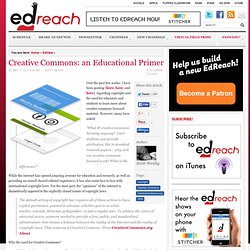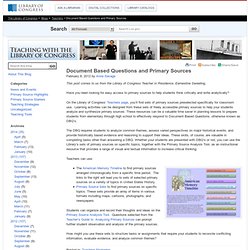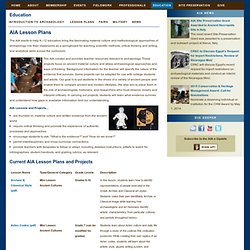

Creative Commons: an Educational Primer. Over the past few weeks, I have been posting (here, here, and here) regarding copyright and the need for educators and students to learn more about creative commons licensed material.

However, many have asked: “What IS creative commons licensing anyway? Can’t students just provide attribution, like in standard research papers… why seek out creative commons licensed work? What is the difference?” While the internet has opened amazing avenues for education and research, as well as providing an overall shared cultural experience, it has also come face to face with international copyright laws. The default setting of copyright law requires all of these actions to have explicit permission, granted in advance, whether you’re an artist, teacher, scientist, librarian, policymaker, or just a regular user. Why the need for Creative Commons?
Copyright law in the United States as well as elsewhere in the world is extremely well established and quite historic in nature. Document Based Questions and Primary Sources « Teaching with the Library of Congress. This post comes to us from the Library of Congress Teacher In Residence, Earnestine Sweeting.

Have you been looking for easy access to primary sources to help students think critically and write analytically? On the Library of Congress’ Teachers page, you’ll find sets of primary sources preselected specifically for classroom use. Learning activities can be designed from these sets of freely accessible primary sources to help your students analyze and synthesize primary sources.
These resources can be a valuable time saver in planning lessons to prepare students from elementary through high school to effectively respond to Document Based Questions, otherwise known as DBQ’s. The DBQ requires students to analyze common themes, assess varied perspectives on major historical events, and provide historically based evidence and reasoning to support their ideas.
Teachers- Maps From The World Digital Library - Primary Source Set. Map Collections Home Page. The Library of Congress Search by Keyword | Browse by Geographic Location Index | Subject Index | Creator Index | Title Index The Geography and Map Division of the Library of Congress holds more than 4.5 million items, of which Map Collections represents only a small fraction, those that have been converted to digital form.

The focus of Map Collections is Americana and Cartographic Treasures of the Library of Congress. These images were created from maps and atlases and, in general, are restricted to items that are not covered by copyright protection. Map Collections is organized according to seven major categories. Searching Map Collections The mission of the Library of Congress is to make its resources available and useful to Congress and the American people and to sustain and preserve a universal collection of knowledge and creativity for future generations. The Library of Congress presents these documents as part of the record of the past. Special Presentations: Cambridge Digital Library - University of Cambridge. Archaeologica. Old Maps Online. AIA Lesson Plans. AIA Lesson Plans The AIA wants to help K–12 educators bring the fascinating material culture and methodological approaches of archaeology into their classrooms as a springboard for teaching scientific methods, critical thinking and writing, and analytical skills across the curriculum.

The AIA creates and provides teacher resources relevant to archaeology. These projects focus on ancient material culture and stress archaeological approaches and ways of thinking. Background information for the teacher will specify the nature of the evidence that survives. Some projects can be adapted for use with college students and adults.
AIA Lessons and Projects... are founded on material culture and written evidence from the ancient world. require critical thinking and promote the experience of authentic processes and approaches. encourage students to ask, "What is the evidence? " Current AIA Lesson Plans and Projects Submit a Project Proposal Lesson Plan Guidelines (pdf)